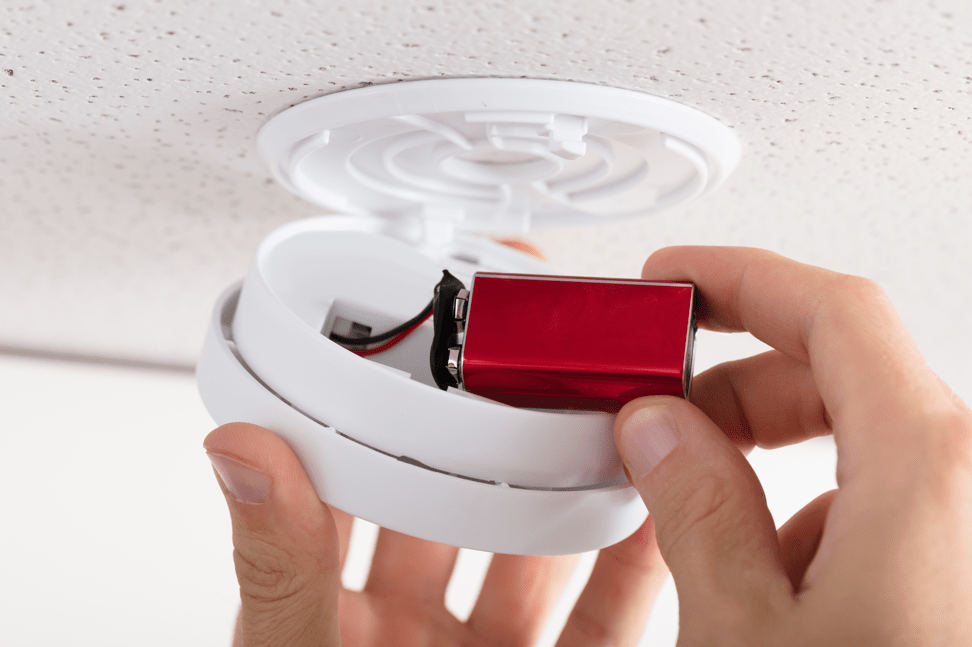Why Does My Smoke Detector Chirp at Night?

Smoke detectors are among the most important safety devices in the home and nobody wants to be woken up because of a false alarm. A chirp, which may or may not suggest a problem, is certainly not as blaring as a smoke alarm during an emergency. It is, nonetheless, something that gets your attention. Here’s why smoke detectors are more likely to start chirping at night.
The Most Common Reason: Low Battery
A smoke alarm chirping every 30 to 60 seconds is usually alerting you of a low battery. However, a chirping battery doesn’t necessarily mean it’s almost dead. Alkaline batteries are affected by temperature. They tend to lose voltage quickly at high temperatures and fluctuate at lower temperatures.
In LA County, where temperatures regularly reach highs of 94°F to 100°F, your battery can lose power quickly. When the evening temps drop during the winter months, the slight drop in voltage may be enough to trigger the smoke detector’s low battery alarm in the cold of night.
Hardwired systems also have a backup battery, so the smoke detector still works in the event of a power outage.
Choosing the Right Battery for Your Smoke Detector
If your smoke alarm is beeping and the battery is the cause, it’s important to change the battery as soon as possible. The 9V battery was the top choice for years, but it’s more common to find AA batteries in your detector. Whether 9V or AA, choose lithium over alkaline when possible.
Purchase new batteries from a reputable store rather than a discount shop to ensure quality. When it comes to safety, it’s better not to take chances. Don’t use the old batteries hanging around in your junk drawer.
Other Reasons for Smoke Detector Chirping
A smoke detector chirping at night doesn’t always mean you have a battery issue. Other reasons include:
- Improperly installed batteries
- Environmental factors like sunlight, humidity, and dust
- Faulty or damaged alarm
- A power outage or tripped circuit breaker
You can also tell what’s wrong by the sound your smoke detector makes. Three short beeps usually indicate smoke detection, while “chirp, chirp, pause” indicates a fault or error with the detector. In some cases, it’s four chips and a pause.
Troubleshooting Suggestions
It’s frustrating to step down from the ladder only to hear the smoke alarm beeping again within minutes. Try the following troubleshooting tips to determine the cause.
Secure the battery
There’s always a chance you installed the smoke alarm batteries improperly. Remove them and install them again, taking care to be precise. It’s a simple task that could save you money.
Find the source
The alarm might not be faulty. A smoke detector can sense rapid changes in temperature, such as steam from a hot shower or a waft of heat from an oven. During wildfire season, it may detect the smoke from outdoors. Look around your home for heat sources that might be setting off the alarm.
Loose or damaged wires
You may have loose, corroded, or damaged wires. Turn the power off at the breaker and visually inspect your detector. Note any loose or damaged wires. A licensed electrician can replace your hardwired alarm and check for the source of the damage.
Check for a flipped breaker or power outage
Any disruption in power can trigger the beeping. Check your breaker panel for a flipped switch. If you find one, flip it back on. However, it’s a good idea to locate the source of the power outage. Flipping the switch back on could be a fire hazard if the circuit flipped due to a short. Contact a licensed electrician if the breaker flips frequently or you can’t locate the source.
Smoke Detector Maintenance Tips
Like any system in your house, smoke detection systems have a fixed service life — usually about 10 years — and can eventually break down. Smoke alarm maintenance helps limit faulty alerts and keep your family safe.
Have your system inspected by a licensed electrician once every one to three years. Our licensed electricians can show you how to test your smoke alarm and ensure the smoke detector batteries are working.
Add your smoke detector to your annual cleaning list. Disconnect the power first, then use a dry cloth to remove built-up dust and residue. Finally, change out alkaline batteries at least once a year. Lithium-ion batteries last up to 10 years.
If you have children, take a moment to explain how the smoke detection system works and establish a fire safety plan.
Do I Need a Smoke Detector?
Yes. Smoke detectors save lives. Each year, approximately 41% of house fire deaths occur in homes without a smoke detector, and 16% of house fire deaths occur in homes with a faulty smoke detector. Power source issues were the most common factor with a smoke alarm failure.
The terms “smoke alarm” and “smoke detector” are often used interchangeably, but they’re different things. A smoke detector is just a sensor and usually part of an overall alarm system hardwired into your home. A smoke alarm is a stand-alone sensor and alarm. However, this distinction is only relevant when you make a new purchase.
Hardwired vs. Battery-Operated Smoke Detectors
In California, smoke detectors are required in all residential homes. Some local jurisdictions require hard-wired smoke detectors. The expert electricians at Express Electrical can advise you on your obligations and help with smoke detector replacement or installation to ensure compliance and safety.
Call Your Los Angeles Electrician for Proper Smoke Alarm Installation
Serving Los Angeles and all of Southern California, Express Electrical is committed to keeping your home and family safe. Local customers depend on us to test and replace their smoke alarms as well to maximize safety during an emergency. For smoke detector tips, 24/7 emergency electrical service, and installations, repairs, and upgrades, call or contact us on the web to schedule a service today!
